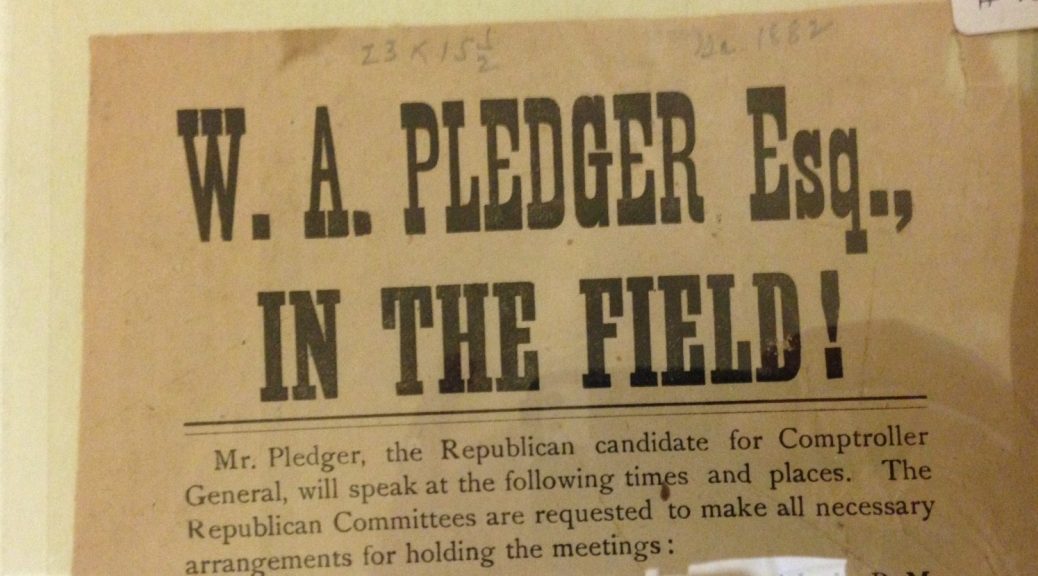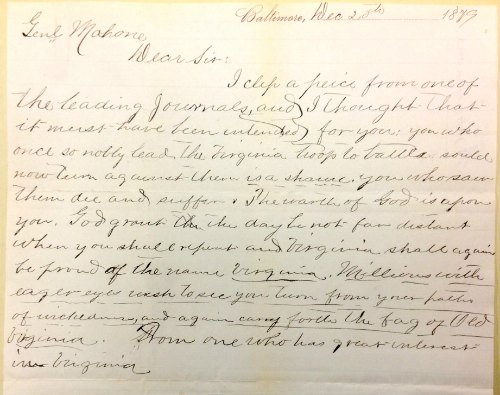Post contributed by Laurin Penland, Library Assistant for Technical Services
Warning: Some of the language in this blog post is outdated and considered offensive today. There are also descriptions of violence against African Americans in the South during Reconstruction.
The way in which archivists think about Reconstruction (1865-1877) in the United States can sometimes determine how we describe and interpret materials produced during that period. For example, if you believe that Reconstruction was an ill-fated, corrupt takeover of the South by Northern Republicans—a brief episode doomed to fail—then it makes sense that you would describe a Republican politician in Georgia as self-interested. The particular politician that I have in mind is John Emory Bryant (1836-1900), who was born in Maine, fought for the Union, and pursued a Republican political career in Georgia after the Civil War. Bryant was also an abolitionist, teacher, agent of the Freedmen’s Bureau, newspaper editor and publisher, and lawyer. The Rubenstein Library holds his papers, the bulk of which were acquired in 1968 (a later addition arrived in 2002). His papers came up recently as a candidate for re-processing due to their popularity among researchers, the aging folders and worn-out boxes housing the collection, and the fact that there were many voices within the collection that could benefit from updated description in the online collection guide. Also, when we investigated further, it became clear that there was a large discrepancy between what was described in the old paper catalog and the online collection guide. The original card catalog entry included 50 cards of description! And the online collection guide included only two small paragraphs. Sometimes this discrepancy happens because of the way the library managed the mass migration of our collection guides online; description was simplified. And sometimes this happens when the description was viewed as problematic for some reason. For the JEB papers, the discrepancy in descriptions could have been for multiple reasons. My task was to assess the description that was available to me and to do my best to improve the collection guide, a process which inspired me to think about how archivists and researchers interpret and describe materials from the Reconstruction Era. This process ultimately led me to edit descriptions of JEB and to make sure that the voices of people of color where discoverable in the collection.
To get an idea of how JEB papers were originally described, here is an unflattering snippet about Bryant from the old card catalog:
On January 1, 1862, Bryant made a significant statement to Emma [his future wife]. He refers to his “enemies,” who are again conspiring against him. He has been under arrest for stealing from a Negro, a charge which was dismissed later. He says he will come out on top, as he always looks out for ‘no. 1.’ This glimpse of his personality is prophetic for the career he later entered.[1]
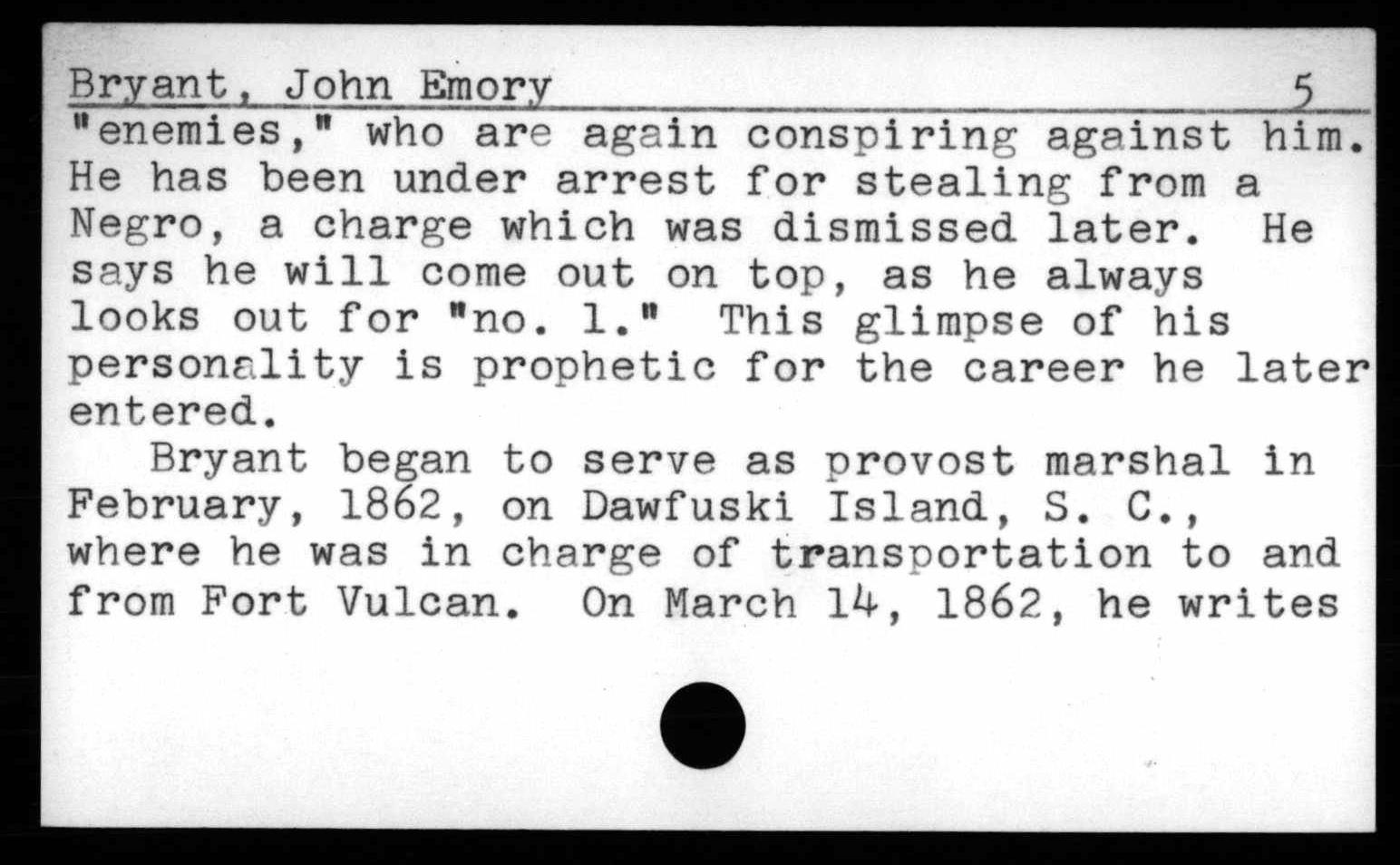
The description portrays Bryant (JEB) as contentious, selfish, and possibly corrupt; the description also gives weighty significance to this episode in JEB’s life by suggesting that it illustrates an important aspect of his personality and the foundation for his political career. I think it’s also important to note that JEB was accused of stealing from a black person, which, if true, would do significant harm to any claims of integrity he might have had in fighting for the civil and political rights of African Americans.

Why did the previous cataloger of this collection choose to highlight this episode in Bryant’s life? One reason could be because of popular notions about Reconstruction during the 1960s—for example, the cataloger, expecting to find a corrupt carpetbagger, could have been drawn to troublesome moments in JEB’s life and career. After all, JEB was no stranger to conflict and controversy in both public and private affairs. In her book, Carpetbagger of Conscience: A Biography of John Emory Bryant, Ruth Currie-McDaniel probes JEB’s life and career, wading through many of his successes, failures, flaws, and contradictions in order to try to discern what kind of Republican he really was. Currie-McDaniel comes down on the side that JEB was a staunch supporter and fighter for civil rights for African Americans; he was also “a complicated mixture of idealistic reform zeal on the one hand and a certain selfish realism on the other,” as well as being a neglectful husband.[2] To say the least, JEB was a complicated person, and the letters that he left behind tell of a controversial personality.
Eric Foner, who is one of the most well-known Reconstruction scholars and who is heavily inspired by W. E. B. Du Bois (Du Bois wrote “Black Reconstruction in America: An Essay Toward a History of the Part Which Black Folk Played in the Attempt to Reconstruct Democracy in America, 1860-1880,” published in 1935), lays out an understanding of Reconstruction in which
the [Republican] Radicals in Congress were acquitted of both vindictive motives and the charge of serving as the stalking-horses of Northern capitalism. They emerged instead as idealists in the best nineteenth-century reform tradition…. Their Reconstruction policies were based on principle, not petty political advantage, for the central issue dividing [President] Johnson and these Radical Republicans was the civil rights of freedmen.
Foner writes that a key element of this understanding of Reconstruction, which is very different than the one depicted by previous historians such as William Dunning and films like Birth of a Nation and Gone With the Wind, is the “testimony of the central participant in the drama of Reconstruction—the black freedman.”[3] While John Emory Bryant was an important player in Republican politics during Reconstruction in the South, I took Foner’s depiction to heart and shifted my gaze beyond JEB’s voice and actions alone. Who were these black freedmen that Foner mentions, and what is their testimony from the Reconstruction Era? This blog post is an exploration of the African-American voices found within the JEB papers.
Daniel Broomfield: School Teacher in Warrenton, Georgia
Scattered throughout the JEB papers, there are myriad portrayals of black people fighting for a better life (and sometimes fighting just to live) by participating in civic, educational, religious, and political organizations. In 1866, one school teacher, who recently built a small schoolhouse, writes to report being shot at:
William John Spence came to the school house last Monday evening just after I had turned out and shot two balls through the house, he then shot three times at me as I run. I only built a small house, I was not able to build a very large one, I done the best I could. I had a good many scholars spelling and reading. I reported to the Bureau here but to very little effect did it take.[4]
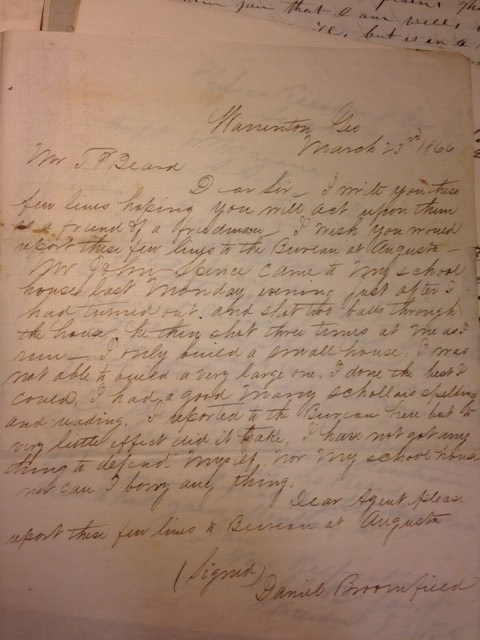
This kind of terroristic violence is documented throughout the John Emory Bryant collection, perhaps most strikingly in a deposition describing KKK activity in Alabama, Florida, and Georgia in the 1870s. The African-American victims listed in the document are: Edward Thompson and his wife in Florida; Boss Fullard, Gamble Wright, and John Askie in Dublin, Georgia; and George Daymond in Montgomery County, Georgia. The atrocities recounted in the deposition paint a picture of white-supremacist terror.[5] We do not know the author of the deposition, but for those who are interested in this account and the efforts to hold the perpetrators of terror and violence responsible, we have another collection at the library that has more information. The Williams Woods Holden Papers, 1834-1929, document the life of a “journalist and Republican governor of North Carolina…. He was elected governor as a Republican in 1868, but was impeached by the Democratic state legislature in 1870 for his efforts to combat the Ku Klux Klan.”[6]
Henry McNeal Turner: Republican Leader, Preacher, Post Master General, and Bishop
In the midst of violence, terror, and constant, ever-present racism (including both hate-filled and less incendiary paternalistic propaganda), black freedmen (formerly enslaved people) and black people who were born free pushed full-steam ahead. The same year that the school teacher, Broomfield, writes to report the assault against him, Henry McNeal Turner (1834-1915) writes a series of letters to JEB. Turner was a chaplain during the Civil War and went on to become a black Republican leader, legislator, preacher, Post Master of Georgia, and bishop in the African Methodist Church. He writes his letters to Bryant while enduring loss and illness in his family; one of Turner’s children had just died and his wife was gravely ill, yet Turner pushed on for Republican causes. He writes to JEB about political news, updates him on his efforts to get subscribers to their Republican newspaper, tells of his hopes for the Georgia legislature, and strategizes ways to inform black citizens about new laws: “Major General Howard at my suggestion is going to print copies of the Emancipation Proclamation, Civil Rights Bill etc. for general distribution through the South for the colored people. I told him there should be thousands of copies distributed like tracts.” When Turner tries to get Democrats to subscribe to his Republican newspaper, he says, “The few democrats that are here, with whom I have come in contact, treat me very scornfully. They say I aught not to speak of those outrages. But the Republicans have assured me, that Mr. Johnson shall execute that civil rights bill or leave his seat. They also say there is more on hand, when they get ready to enforce it, and they will do it.”[7] The Civil Rights Act about which Turner is writing was passed on April 9, 1866 (three days before Turner’s letter). This act provided:
that all persons born in the United States and not subject to any foreign power, excluding Indians not taxed, are hereby declared to be citizens of the United States; and such citizens, of every race and color, without regard to any previous condition of slavery or involuntary servitude, except as a punishment for crime whereof the party shall have been duly convicted, shall have the same right, in every State and Territory in the United States, to make and enforce contracts, to sue, be parties, and give evidence, to inherit, purchase, lease, sell, hold, and convey real and personal property, and to full and equal benefit of all laws and proceedings for the security of person and property, as is enjoyed by white citizens, and shall be subject to like punishment, pains, and penalties, and to none other, any law, statute, ordinance, regulation, or custom, to the contrary notwithstanding.[8]
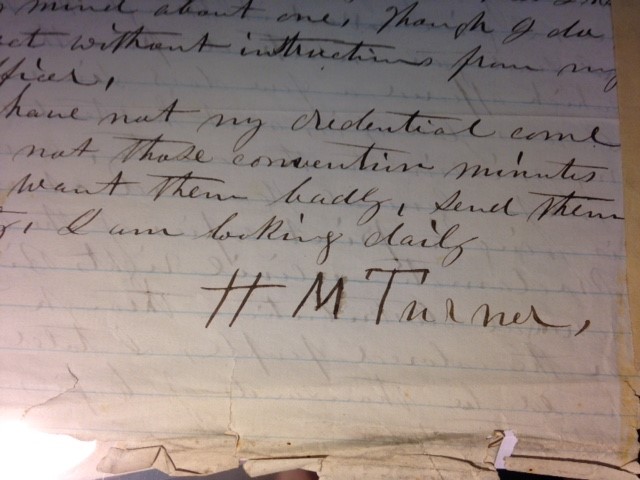
The law was passed, vetoed by President Andrew Johnson, and then passed again with a two-thirds majority. In another letter, Turner offers aid to JEB, who, he has heard, has been arrested and whose paper was suppressed. He writes, “If you are in great need, write to Oliver Sanders of Columbus, Ga. I helped them to organize a society there, and they have some money, which they will send you as quick as lighting if you need it.” Turner’s letters show someone who was deeply engaged in the issues of the time, made personal sacrifices to fight for what he believed in, and cared for his friend and colleague, JEB.
Charles R. Edwardes: Preacher and Labor Organizer
One of the common threads that connects several of the people in the Bryant papers is the importance of newspapers. JEB, along with Turner and William Anderson Pledger (who I’ll mention later), published Republican newspapers, which allowed them to share their ideas more widely and broaden their connections throughout Georgia. One African-American minister, Charles R. Edwardes, writes to JEB in 1869 to tell him about his efforts to get more subscribers for Bryant’s newspaper, and to inform Bryant of a meeting—of the Colored Men of the Mechanics and Laboring Men Association—that he would like to be mentioned in the newspaper. Edwardes reports that there are 87 members of the Association and that he hopes they will have many more members soon. At the meeting, the men counted how much land they had purchased, how many crops they had produced, and how much money they had made as tradesmen. Edwardes explains, “We wants to buy land as soon as we can to give homes to our poor peoples for many don’t [have] homes and land to work and cheated out what money works for. I have some promise to take your paper. I will do all I can to have this paper among my people. Do what you can for us.” [9]
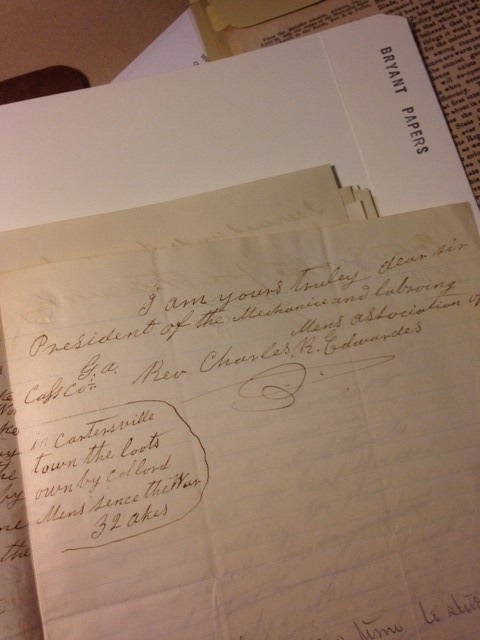
William Anderson Pledger: Teacher, Republican, Lawyer, Newspaper Publisher
My Dear Sir: The schools of this county being in the hands of the Democrats and they having such an avowed hatred to me till it has become impossible for me to obtain employment. Their hatred is because of my Republican principles, or because that I speak them freely—yet moderately. Consequently I must have recourse to my Republican friends to obtain a livelihood: to you I look as a very dear friend, because you know the privations an active Republican is subjected….[10]
This letter is written by William Anderson Pledger, who was a prominent black Republican in Georgia. He was also an editor, teacher, and friend of JEB. Pledger’s letter press copybook (dated 1875-1879) includes faint copies of letters written to various Georgian politicians and Republicans, including John Emory Bryant, Henry McNeal Turner, E.R. Belcher, Benjamin Conly, Henry Farrow, M.T. Ackerman, and others. Many of the letters show his urgent attempts to attain employment and describe the discrimination that he faced due to his Republican political activities. In a different letter, he writes, “The Democrats have offered me if I would only leave off indoctrinating ‘radicalism’ into the negros’ [sic] heads that they would put at my disposal any position I wanted. You know I can not go back on Republicanism though I perish from this uncivilized conduct.”[11]
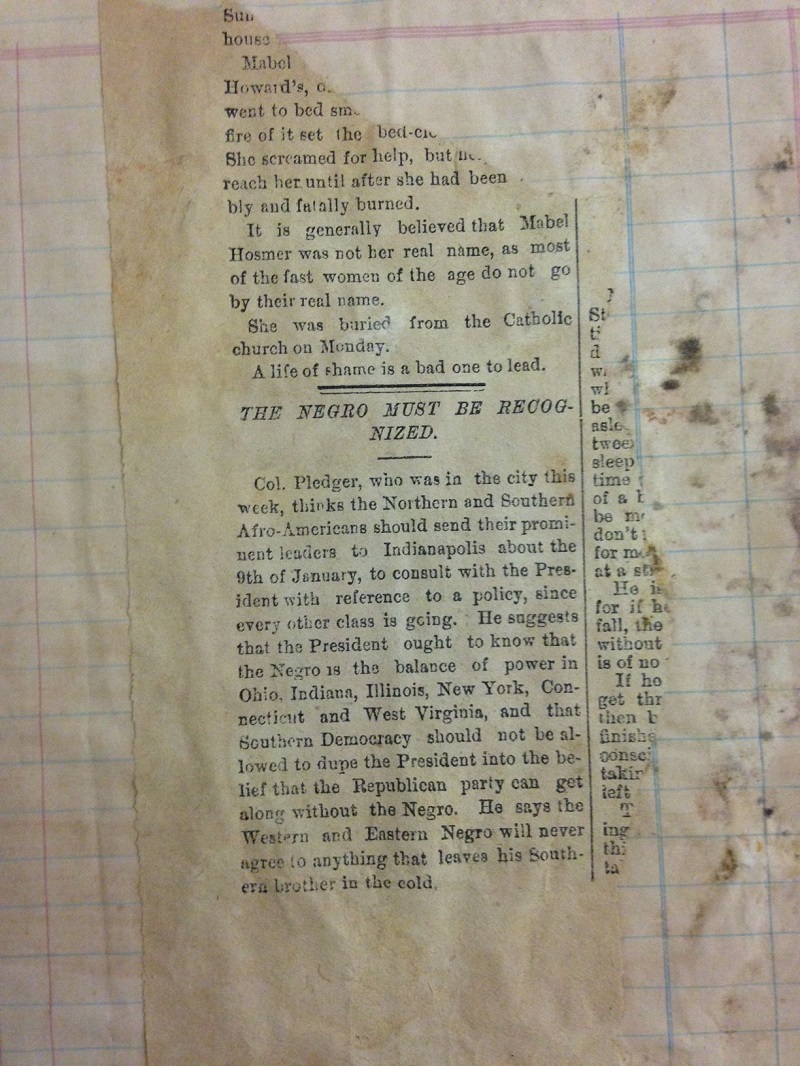
Pledger’s letters and scrapbook also show his engagement with social and political organizations, such as the Grand Fountain of Georgia (also referred to as the “colored Good Templars”), a black temperance organization.[12] Pledger was the Grand Worthy Master of the State in Georgia in 1876 and was credited with increasing the membership from 2000 to 8000.[13] These types of fraternal organizations were often at the heart of segregation battles that would go on to define the Jim Crow South. In a newspaper clipping, Pledger writes to the editor about a dispute within the Grand Fountain between the white and “colored” lodges, and he explains how the matter has been settled in his favor by the organization’s supreme court in England. Another clipping from 1878 describes “Emancipation Day,” which “was held in the First Congregational Church on Collins Street on Tuesday night, January 1st to celebrate the anniversary of Emancipation.”[14] There, the Emancipation Proclamation was read aloud and speeches were given, including one by Pledger. It is clear that Pledger was highly active in the public sphere. In The Way It Was in the South: The Black Experience in Georgia, author Donald Grant describes Pledger as being at the center of Republican politics: “he was a delegate to every Republican national convention from 1876 to 1900 and remained on the state Republican committee until his death in 1904.” In 1879, “smoldering black resentment against the white leadership of the Republican party resulted in a revolt by the blacks, who elected a new state committee of twenty-four blacks and eight whites. Black leader William A. Pledger led the revolt and replaced John E. Bryant as party chairman.”[15] During this period of Reconstruction, there was an internal struggle in the Republican Party against the lily-whites (those who wanted all-white leadership) and the black-and-tans (a coalition of blacks and whites). Three years after Pledger was elected chairman, he was “ousted” and “replaced by a white, Alfred E. Buck.”[16] Another important shift during this time was African-American disenfranchisement. During this moment in Reconstruction, black voting and participation were at their height: “In 1876, 53 percent of the eligible black males voted. The white vote was only slightly higher.” However, due to poll taxes, the Populist defeat, the lack of secrecy of ballots, the barring of black voters from primaries (called the “white primary”), intimidation and violence, and other disenfranchising efforts, black voting hit its nadir in Georgia in 1904 at 4 percent.[17]
Pledger was also a journalist and newspaper publisher. He founded The Athens Blade in 1879 “with the credo: ‘The Arm of justice Cannot—Will not Sleep,’” and he was very engaged in the debates of the time, such as the plan for African Americans to emigrate to Liberia.[18] Pledger also helped organize the Afro-American League (which later became the Afro-American Council) in 1890 in Chicago, and he was known for fighting against lynching. He “once led armed blacks to the Athens jail and successfully defied a mob bent on lynching two prisoners.”[19]
Altogether, Pledger’s papers show someone who seized upon the political momentum of the time to fight for a Republican platform that was built on equal rights for African Americans.
Conclusion
As archivists, when we preserve, organize, and describe manuscript collections, sometimes it is tempting to try to decide whether someone like John Emory Bryant did more good in the world than harm. To complicate matters, it is unclear how much significance to attribute to the correspondence, ephemera, and artifacts left behind by historical figures (e.g., we wonder whether these papers represent the whole person). In this case, widening my gaze beyond John Emory Bryant to his broader context and networks helped me address the issues at the center of this collection of papers, such as the Republican social and political fabric during Reconstruction, and, in particular, it illuminated the testimony of those fighting for equal rights, especially people of color. To give credit where credit is due, much of the work to describe this collection had been done by previous catalogers and researchers. My work benefited from the detailed description in the old card catalog, which highlighted contributions by Pledger, Turner, and others. In my revised collection guide, I built on the work that came before me, updated the language, and edited out descriptions that may have tried to pigeon hole Bryant as a self-interested Carpetbagger. Most importantly, widening my view helped me to make choices in my description of the collection, ultimately placing less focus on Bryant’s eccentricities and more focus on making a variety of voices discoverable. For instance, previously, the KKK disposition had been relegated to a “Miscellaneous” folder and was not described. Now, it has its own folder and is discoverable in the collection guide. This is not to say that now—fifty years after we acquired this collection—the description is finally complete. It can always be improved; and perhaps fifty years from now, archivists and researchers will take a new approach to this collection.

As an addendum, I would like to address the fact that all of the people mentioned in this blog post are men. John Emory Bryant, while being a supporter of equal rights for men of color, did not support women’s suffrage or equal rights for women. However, there is copious correspondence in the collection between Bryant and his wife, Emma Spaulding Bryant, which is deserving of a blog post of its own. Emma Bryant often pushed back against ideas of male dominance and superiority. We have digitized a small portion of her correspondence that documents a particularly passionate response to John, who apparently objected to Emma seeing a male doctor about “uterine difficulties” without John’s permission or presence. Thanks to historian Ruth Currie-McDaniel, you can find a published collection of Emma Spaulding Bryant’s correspondence in Duke Libraries’ general collection: Emma Spaulding Bryant: Civil War Bride, Carpetbagger’s Wife, Ardent Feminist.
You can find out more about collections at the Rubenstein relating to Reconstruction by visiting our Emancipation and Reconstruction Eras LibGuide. Also, you may be interested in this blog post: https://blogs.library.duke.edu/rubenstein/2013/11/12/the-african-americans-rubenstein-recap-3/.
[1] Card catalog entry for the John Emory Bryant Papers, David M. Rubenstein Rare Book & Manuscript Library.
[2] Ruth Currie-McDaniel, Carpetbagger of Conscience: a Biography of John Emory Bryant (Athens: University of Georgia Press, 1987), 182.
[3] Eric Forner, “The New View of Reconstruction,” American Heritage 34, Issue 6 (October/November 1983): 10-15.
[4] Daniel Bromfield letter, 1866, John Emory Bryant Papers, David M. Rubenstein Rare Book & Manuscript Library, Duke University.
[5] Deposition describing Ku Klux activity in Alabama, Florida, and Georgia, 1870s, John Emory Bryant Papers, David M. Rubenstein Library, Duke University.
[6] William Woods Holden Papers, David M. Rubenstein Rare Book & Manuscript Library, Duke University.
[7] Henry McNeal Turner letters, 1866, John Emory Bryant Papers, David M. Rubenstein Rare Book & Manuscript Library, Duke University.
[8] United States, The Statutes at Large, Treaties, and Proclamations, of the United States of America, from December, 1865, to March, 1867 (Boston: Little, Brown, and Company, 1868), 27.
[9] Charles R. Edwardes letter, 1869, John Emory Bryant Papers, David M. Rubenstein Rare Book & Manuscript Library, Duke University.
[10] William Anderson Pledger letter press copybook, page 23, John Emory Bryant Papers, David M. Rubenstein Rare Book & Manuscript Library, Duke University.
[11] Ibid., 145. Emphasis in original.
[12] William Anderson Pledger scrapbook, John Emory Bryant Papers, David M. Rubenstein Rare Book & Manuscript Library, Duke University.
[13] “United Order of True Reformers,” Savannah Tribune (published as The Colored Tribune), February 5, 1876.
[14] Pledger scrapbook.
[15] Donald L. Grant, The Way It Was in the South: the Black Experience in Georgia (Athens, Georgia: University of Gerogia Press, 2001), 131.
[16] Ibid., 132.
[17] Ibid., 200-201.
[18] Ibid., 258.
[19] Ibid., 166.


